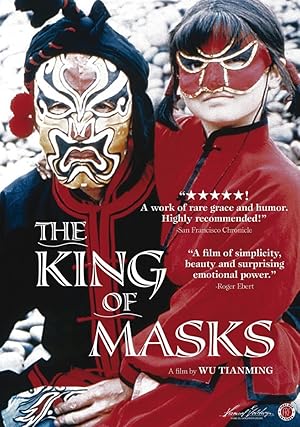The King of Masks
| 1995Directed by: Tian-Ming Wu
Main Plot
The King of Masks follows the story of a renowned street performer in 1930s China, known for his mastery of the traditional art of mask changing. Despite his success, he faces the challenges of aging and the societal norms of his time, particularly regarding lineage and legacy. In a bid to secure an heir to pass on his craft, he adopts a young boy, believing he will carry on the tradition. However, he soon discovers that the boy is actually a girl disguised as a boy, which complicates their relationship and the performer’s expectations. As the story unfolds, themes of gender identity, societal constraints, and the bond between the two characters emerge, leading to moments of both conflict and understanding. The film explores the struggles of the artist in a changing world and the personal sacrifices made for the sake of art and family.
Characters
- Xu Zhu: A kind-hearted street performer whose mastery of ancient mask-changing art becomes the unlikely vehicle for hope and transformation in a world shadowed by tradition.
- Renying Zhou: A spirited orphan whose unexpected bond with an old artist reveals the deep chasm between societal norms and the purity of human connection.
- Zhigang Zhao: A determined police officer whose investigation into street performers intertwines with personal redemption and the unyielding quest for justice.
Ending Explained
In The King of Masks, the ending resolves the central conflict surrounding the protagonist, a master of the traditional art of mask-changing, who struggles with the societal norms of masculinity and the desire for a male heir. After a series of trials and tribulations, including the discovery that his adopted grandson is actually a girl disguised as a boy, the protagonist faces a profound internal conflict. In the climax, he is forced to confront his prejudices and the rigid expectations he has held regarding gender roles. The turning point occurs when he witnesses the girl's unwavering dedication to learning the art, despite the societal limitations imposed on her. This realization leads him to embrace her talent and potential, ultimately allowing him to break free from his traditional views. The film concludes with a poignant moment where the protagonist performs a mask-changing act with his adopted granddaughter, symbolizing his acceptance and love for her. This act not only signifies the passing of his legacy but also highlights the theme of breaking gender barriers. The ending reinforces the narrative's exploration of identity, acceptance, and the transformative power of love, ultimately suggesting that true artistry transcends societal constraints.
